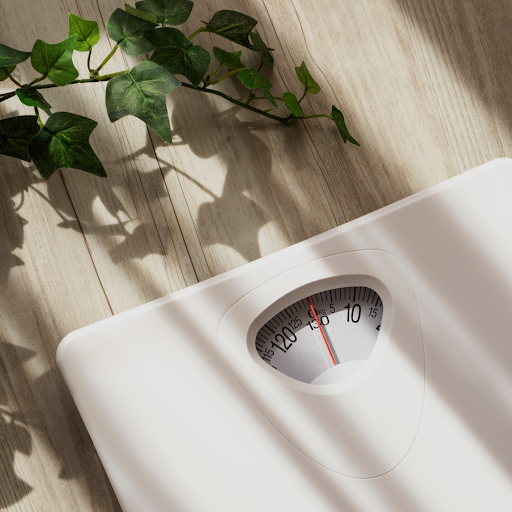4 Reasons to Ditch the Scale (From a Dietitian)

If stepping on the scale feels like a daily ritual that dictates how you eat, move, or feel about yourself…you’re not alone.
For many, especially those recovering from an eating disorder or struggling with disordered eating, the scale becomes less of a tool and more of a trigger.
While the scale may seem useful to track health, the number it shows often tells only a fraction of the story. As an eating disorder dietitian, I’m here to share why ditching the scale can be one of the most powerful steps toward healing your relationship with food, body, and self.
4 Reasons to Ditch the Scale
In our society, it’s no surprise that so many people focus on body weight. We’re constantly told that the number on the scale is the most important measure of health and success. And, while tracking how much you weigh might be helpful for some, for many others it can become harmful, obsessive, or even triggering. Here are four powerful reasons why it might be time to ditch the scale, especially if it’s doing more harm than good for you.
#1: It May Cause Disordered Eating
Weighing yourself can quickly become a harmful habit that drives disordered eating patterns and eating disorder behaviors. That tiny number can influence your entire day from what you eat, how much you move, to how you feel about yourself. For many of my patients, chasing a lower weight leads to restriction, bingeing, or compensatory behaviors. For example, if some patients see the number on the scale rise, they restrict their food intake resulting in binge eating at night. If the scale determines your choices in a negative way, it’s worth pausing to ask: is this helping, or is it hurting?
#2: It Can Lead to Increase Anxiety and Depression
Let’s be real: using scale isn’t usually a neutral experience. It can spark dread before stepping on and spiral after stepping off – especially if the number isn’t what you expected. For those with a history of disordered eating behaviors or body image struggles, this emotional rollercoaster can intensify anxiety and even worsen depressive symptoms. In fact, a 10-year study found that frequent self-weighing was linked to increased depression, weight concerns, and lower self-esteem, especially in young women. Your mental health is just as important as your physical health. If the scale disrupts your peace more than it supports your well-being, it’s time to let it go.
#3: It May Worsen Your Relationship with Your Body and Self
Regularly stepping on the scale may lead to obsessive body checking and constant comparison, making it harder to feel at peace in your body. When your self-worth is tied to a number, even slight fluctuations can feel like failure. Over time, this habit can chip away at body trust and increase feelings of shame or frustration, especially if the number never seems “good enough.”
#4: Weighing Less Doesn’t Equal Health
Health isn’t a number, it’s a dynamic, whole-person experience that includes physical, emotional, and social well-being. And guess what? People can be healthy at a variety of body sizes and you don’t have to make weight loss your main focus. In reality, factors like access to healthcare, safe environments, food security, balanced eating patterns, joyful movement, decreased stress, etc. have a much bigger impact on long-term health outcomes than weight alone. Ditching the scale doesn’t mean giving up on your health, it means redefining what it truly means to care for yourself.

What to Track Instead of Weight
If stepping on the scale has become a daily ritual, or a source of stress, you’re not alone. The good news? There are so many other ways to measure progress that are more supportive, sustainable, and aligned with your overall well-being. Here are a few things you can track that have nothing to do with a number on a scale:
- Energy Levels: Are you feeling more energized throughout the day? Do you have enough fuel to get through your workouts, workdays, or time with your family?
- Sleep Quality: Tracking how rested you feel in the morning can be a powerful sign of how your habits are supporting your health.
- Mood and Mental Health: Are you feeling more emotionally balanced? Less anxious around food or your body? Happier overall? These are huge wins that often go unnoticed.
- Hunger and Fullness Cues: Learning to reconnect with your body’s natural signals is a sign of healing your relationship with food and it’s worth celebrating.
- Strength and Endurance: Are your workouts feeling easier? Are you lifting heavier, walking longer, or simply feeling more capable in your body?
- Fruit and Vegetable Intake: Are you getting a variety of colors on your plate? Increasing your intake of fruits and veggies can boost fiber, antioxidants, and vitamins and minerals without any focus on weight.
- Consistency with Habits: Things like cooking at home more often, practicing joyful movement, or reducing emotional eating can be great signs of progress.
- How You Feel in Your Body: Feeling more comfortable in your clothes, less preoccupied with food or your appearance, or simply feeling more at home in your body – these are signs of real growth.
Frequently Asked Questions
Is weighing yourself every day bad?
Weighing yourself on a daily basis isn’t necessary, and for many people, it causes more harm than good. Your weight naturally fluctuates throughout the day due to things like your period, digestion (yep, just needing to poop), hydration, salty meals, or even eating foods high in carbs. If weighing yourself doesn’t feel triggering, doing it no more than once a week may be a more balanced approach to reduce obsessive thoughts.
Should people with eating disorders have scales?
In most cases, no. Individuals with eating disorders or disordered eating may find that having a scale at home can fuel obsessive behaviors and worsen body image concerns. However, some providers may use blind weighing, a practice where only the provider sees the weight, not the client. This can support clinical care while minimizing emotional distress. But in general, seeing your weight during recovery isn’t helpful or necessary.
When should I use the scale?
If you feel neutral toward your weight and it doesn’t dictate your mood, the scale can sometimes be used as one tool among many to track health changes. However, it’s important to remember that it’s just one small data point, not a full picture of your health. If the number tends to derail your day on a regular basis, it may not be the right tool for you right now (or ever…and that’s okay).
How can I request not to be weighed in the doctor’s office?
You can absolutely advocate for yourself at medical appointments! A simple phrase like, “I prefer not to be weighed unless it’s medically necessary” works well. Many clinics are becoming more aware of weight-inclusive practices, and some even have “don’t weigh me” cards available to hand to staff. Here’s a free one you can print at home!

Final Thoughts: Letting Go of the Scale, Gaining Peace of Mind
At the end of the day, weight is literally just a measure of gravitational pull. It doesn’t tell the full story: about your health, your habits, or who you are as a person. So why let it take up so much space in your mind?
In a society obsessed with weight, choosing to ditch the scale is a radical act of self-trust. It doesn’t mean you’re giving up, it means you’re choosing a different path. One where your worth isn’t defined by a number, but by how you feel in your body and how you care for your well-being.
Ready to take the first step in healing your relationship with food and your body? A Gentle Introduction to Intuitive Eating is coming soon. This 4-week course will help you break free from food guilt, stop the yo-yo dieting cycle, and finally feel more at peace around eating.
Enroll now to get instant access and a special bonus upon completion!
